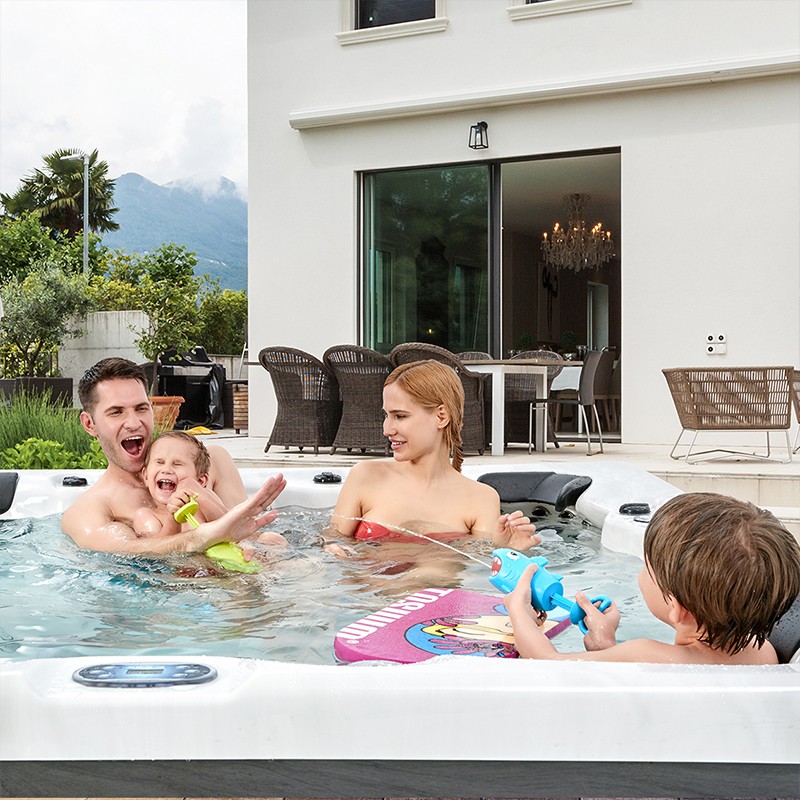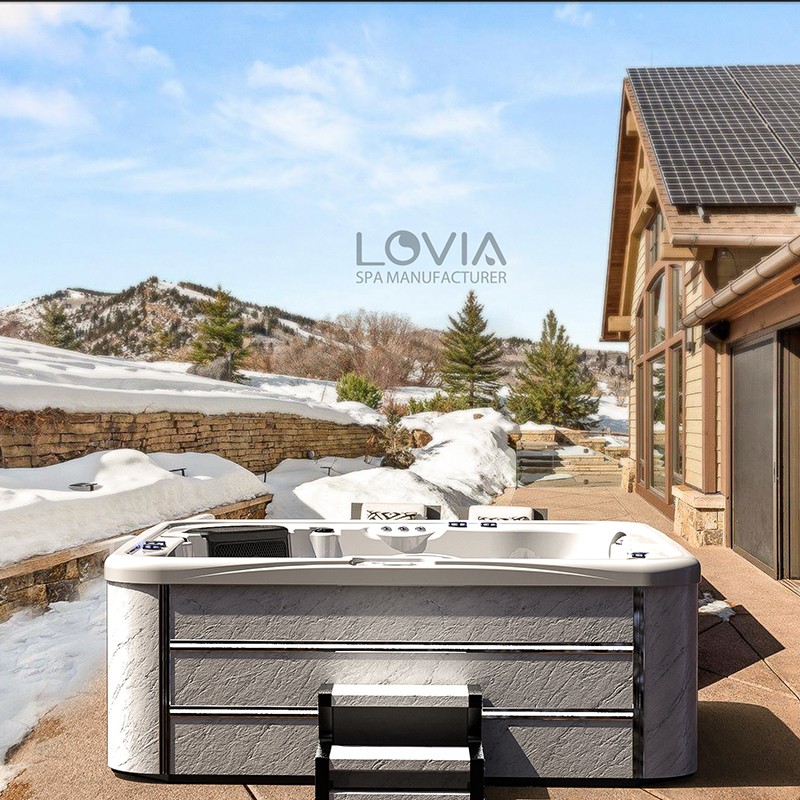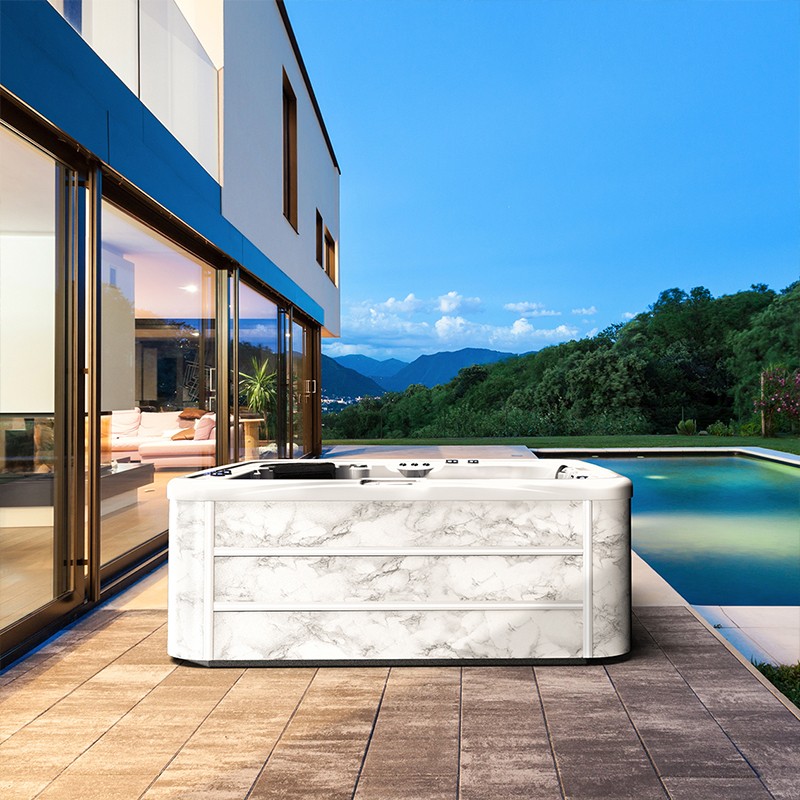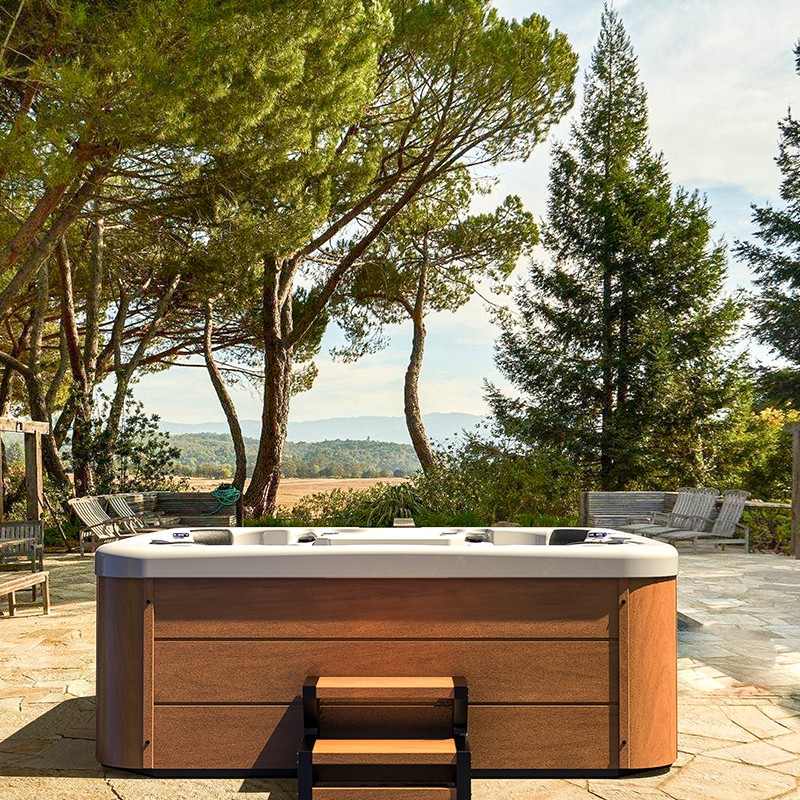
How to Care for an Acrylic Spa Tub?
2025-10-20 15:30Acrylic spa tubs, due to their lightweight, aesthetically pleasing design, excellent thermal conductivity, and easy maintenance, are widely used in home bathrooms, wellness centers, and private spas. However, regardless of their quality, if they are not properly maintained and cleaned, they can easily develop yellowing, scratches, tarnishing, and clogging. In severe cases, these issues can even lead to system failure or water contamination.
This article systematically explains the key points of daily care for acrylic spa tubs, covering cleaning methods, water quality control, component maintenance, and usage habits. This will help users scientifically extend the life of their tub and maintain an ideal user experience.

Understanding the Material Properties of Acrylic Spa Tubs
To prescribe the right treatment, you first need to understand the basic structure and material properties of acrylic spa tubs.
1. Material Composition
Acrylic spa tubs are primarily composed of the following layers:
· Acrylic surface layer (PMMA): In direct contact with water and the human body, with a smooth, chemical-resistant surface, but soft and easily scratched;
· Fiberglass reinforcement: Enhances overall strength;
· Insulation layer (polyurethane or foam): Maintains water temperature and enhances comfort;
· Internal piping and jet system: Provides hydrotherapy functionality.
2. Material Characteristics
· Not resistant to strong acids and alkalis;
· Susceptible to high-temperature damage;
· Surface easily scratched, but can be lightly repaired;
· Not suitable for cleaning with rough or abrasive tools.
Understanding these characteristics is a prerequisite for effective maintenance.

Daily Cleaning and Maintenance of Acrylic Spa Tubs
Maintaining cleanliness is fundamental to maintaining an acrylic spa tub and the first step to preventing material aging and system failure.
1. Frequency of Use and Cleaning Recommendations
Frequency of use | Recommended Cleaning Frequency |
| Daily use | Clean after each use |
| Use 2-3 times a week | Clean twice a week |
| Occasional use | Clean after each use |
2. Recommended Cleaning Tools
· Soft, non-woven cloth or sponge;
· Neutral pH detergent;
· Non-abrasive acrylic cleaner;
· Soft-bristled brush (for use in the nozzle crevices);
· White vinegar (diluted appropriately for descaling);
· Purified water (for final rinse).
The following items are strictly prohibited:
· Steel wool, coarse-fiber rags;
· Cleaners containing ammonia, bleach, or strong acids or alkalis;
· Dry sandpaper or cleaning knives.
3. Detailed Cleaning Procedures
Step 1: Drain and Turn Off the Power
· After use, drain the water first.
· Turn off the power to prevent the nozzle from accidentally activating during cleaning.
Step 2: Initial Rinse
· Rinse the acrylic surface with warm water to remove foam, grease, and dust.
Step 3: Cleaning
· Spray an appropriate amount of neutral detergent onto a damp cloth or sponge, avoiding pouring directly onto the tub surface.
· Wipe the interior of the acrylic spa tub in circular motions, paying special attention to corners and the showerhead.
Step 4: Treating Scale and Soap Scum
· For areas with scale, spray with a 1:1 diluted white vinegar solution. Let it sit for 5 minutes before wiping with a soft cloth.
· Rinse thoroughly and wipe away any remaining liquid with a dry cloth to prevent re-deposition.
Step 5: Cleaning the Showerhead
· Disassemble or wipe the showerhead to remove any blockages and soap scum.
· Run the "Self-Cleaning" cycle monthly or manually refill with cleaning solution (refer to the product manual).
Step 6: Polishing (Optional)
· Polish with acrylic maintenance wax to improve stain and scratch resistance.

Water Quality Control and Chemical Treatment for Acrylic Spas
Poor water quality can directly damage acrylic panels and internal piping. Therefore, water quality control is a crucial part of maintenance.
1. Recommended Water Source
·Preferably use softened water or tap water treated through a filtration system.
·Avoid using well water or water with excessive hardness, as these are prone to scaling.
2. Water Quality Parameter Reference Ranges (for home users)
Items | Recommended range |
| pH | 7.2 to 7.6 |
| Hardness | 100 to 250 ppm |
| Chlorine Content (Disinfectant) | 1 to 3 ppm |
| TDS | < 1000 ppm |
3. Chemical Usage Precautions
·Regularly add disinfectant (chlorine tablets or hydrogen peroxide), but control the concentration.
·Avoid overdosing, as this can corrode the acrylic surface and rubber seals.
·Change the water monthly, especially during periods of heavy use.
·Use test strips or a tester to regularly monitor water quality.
Maintaining the Spa System and Jet Components
An acrylic spa tub consists not only of the tub structure itself but also of multiple moving and functional components, such as the jets, electric pump, and circulation piping.
1. Jet Maintenance
·Clean the jet outlet weekly to prevent clogging.
·Disassemble the jet regularly to inspect for hair, soap scum, or other debris.
·For some models, soak the jet in vinegar and water to remove calcified deposits.
2. Pipe Flushing (Internal Cleaning)
It is recommended to perform pipe flushing once a month:
· Fill the tub with water until full and add a dedicated pipe cleaning solution;
· Enable the massage function and run for 15-20 minutes;
· After draining, refill with water and rinse until the cleaning solution is completely removed;
· Avoid residual foam and secondary contamination.
3. Water Pump and Control System
· Regularly check the pump for smooth operation and abnormal noises;
· Avoid continuous operation for extended periods to prevent motor overheating;
· If not in use for an extended period, disconnect the power supply and drain the pipes to prevent water accumulation and scale formation.
Usage and Daily Precautions
1. Proper Usage
· Shower before entering the tub to reduce the amount of body oil and impurities entering the water;
· Do not use foam bath salts or essential oils in acrylic spa tubs unless specifically indicated for use;
· The water temperature should not exceed 40°C, as high temperatures can cause acrylic to warp;
· Avoid sitting or placing excessive weight on the tub edge to prevent cracks or delamination.
2. Regularly Check Structural Integrity
· Check the base of the acrylic spa for small cracks;
· Check the jets and joints for signs of water seepage;
· Repair any early damage promptly, using a special acrylic repair agent.
3. Treatment for Extended Non-Use
· Drain completely;
· Clean and air dry;
· Cover with a dust cover to prevent dust and insects from entering;
· Disconnect the power supply to prevent moisture from entering the electronic control system.

Common Mistakes and Corrective Actions
Common Mistakes | Correct Methods |
Using alcohol, bleach, or toilet cleaner to clean acrylic surfaces | Use a neutral detergent or a specialized acrylic cleaner |
Not changing the water for extended periods of time, relying solely on disinfectant tablets for sterilization | Change the water supply at least once a month and thoroughly clean the pipes |
Using a stiff brush or steel wool to scrub acrylic surfaces | Gently wipe with a soft sponge or non-woven cloth |
| Ignoring clogged or noisy showerheads and leaving them running for extended periods | If any abnormality is detected, immediately stop use and perform cleaning and maintenance |
| Using non-specialized bath products such as laundry detergent, bath salts, and essential oils | Only use products specifically labeled for use in acrylic spas |
How do you assist distributors with marketing?
Beyond Manufacturing, our Company supports distributors by providing brochures, technical specifications, high-resolution photos, and promotional videos. This helps our partners with sales campaigns and promotions. Buyers can purchase not only high-quality spas but also marketing assets to accelerate local sales.
We offer discounts on showroom units and provide quotes for demo models. As a supplier, we ensure that our Wholesale partners succeed by combining low-price factory supply with effective promotional support.
